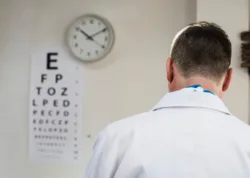
Although discussing one’s addiction is not usually on the top of the list of enjoyable conversation starters, chatting with your doctor about a substance use disorder can be very important to your overall health and wellbeing, and ultimately your successful recovery. Addiction can have various negative effects on your body, and it can be helpful for the doctor to understand your background so as to more accurately assess anything physical that might be going on in your body.
Prescription drugs: the medication question
It is not uncommon for doctors to prescribe patients pain-relieving medications containing addictive substances after major medical procedures. If your doctor is unaware of an existing or previous addiction, they may unknowingly write a prescription for a medication that you have a higher risk of abusing, such as opioids.
Even if your doctor does know about the full extent of your medical history, not all healthcare professionals fully understand the implications of addiction and what it means to be in recovery. In sum, a factual awareness of addiction doesn’t necessarily imply a corresponding understanding of what medications should be off-limits. Because of this, those in recovery must advocate for themselves and educate their doctor about their experience and what types of medications they are unable to take.
No more excuses.
It is common for people to feel uncomfortable talking to their doctor about their substance use history; sometimes they feel it is unwarranted or unnecessary personal information to share. Here are some common excuses that hold people back from discussing addiction with their doctor, and responses that explain why disclosing this information is a vital aspect of a healthy recovery.
1) “I am worried that my doctor will judge me.”
Doctors are medical professionals and are trained in the medical model of addiction. As a result, they understand that addiction is a disease, not a choice that a person should be judged for. If someone who has struggled with substance abuse feels that their doctor is not understanding their addiction history or what it means to be in recovery, perhaps they should consider finding a different physician who is better suited to their personalized needs. There are countless dedicated doctors who have backgrounds in addiction studies that would make great options for primary care.
Although it might be uncomfortable at first, your willingness to dialogue about your experience with addiction might actually help to further medical policy about treatment options for other people in similar situations. Hospitals and health practices are on the front lines of combatting many addictions, especially opioid use. Many are now even auditing their own system to close the gaps in their part of the addiction cycle. Being honest with a physician’s practice is a great way to help them build up their processes and understand alternative ways to treat pain and symptoms.
2) “But my doctor treats the whole family.”
Many people are concerned that discussing addiction with their doctor might jeopardize their privacy if members of their family or close community see the same physician. However, due to HIPAA, doctors are forbidden to discuss any kind of medical history, including substance abuse, with anyone without the patient explicitly granting permission to do so. Discussing substance use disorder or recovery with anyone who has not been authorized to receive that information is illegal. Personal information about addiction is not only protected by hospital regulations, but the law as well.
3) “I can do this alone.”
Some patients don’t consider it necessary to tell their doctor about their history with addiction because they think that they will be able to hold themselves accountable. The problem with this, however, is that doctors who are unaware of someone’s addiction status may prescribe a narcotic to them in treatment for an ailment. A simple prescription can be a relapse in disguise. Although someone in recovery may think that they will always have the strength to say no, the reality is that every day is different. A recovering addict could have had a particularly tough day, or encountered some other triggers, making them an easy target for a relapse. If your doctor is aware of your addiction history, they can help to set you up for success in your road to ongoing recovery.
Get help today
If you’d like additional suggestions for how to talk with your doctor about being in recovery from a substance use disorder, consider talking to a counselor from Rehab After Work. You can schedule an intake appointment today by calling (610) 644-6464.






